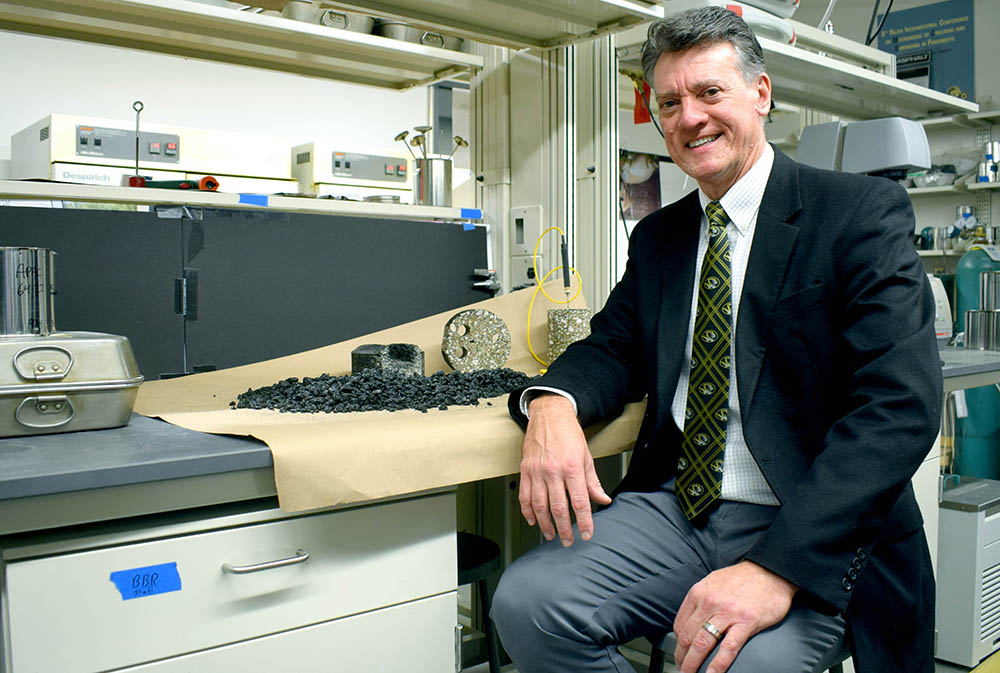December 14, 2021

Glen Barton Chair in Flexible Pavements Bill Buttlar in the Mizzou Asphalt Pavement and Innovation Lab.
Plastics are made to last hundreds of years. That’s a problem when you’re talking about bottles, bags and straws discarded after one use. However, for roads that need to support heavy traffic over the course of decades, plastic could be an ideal solution to fix the nation’s crumbling infrastructure.
Mizzou Engineering’s Bill Buttlar and partners from Dow are looking at ways to incorporate plastic waste streams into asphalt mixtures. Earlier this semester, they worked with the Missouri Department of Transportation (MoDOT) to test their innovative pavement on a stretch of Stadium Boulevard in Columbia. Now, they’re working with state and national agencies to see how it works laid over concrete or whether it can slow cracking on asphalt surfaces.
If the mixture proves durable, it could not only improve our roadways but also divert millions of tons of plastic from landfills and oceans each year.
“Our excitement is higher than any project we’ve worked on in that our enthusiasm has been matched by the general public,” said Buttlar, the Glen Barton Chair in Flexible Pavements in civil engineering. “Colleagues, neighbors, community members — people really raise an eyebrow and show extraordinary interest in seeing this be successful.”
Why it matters
Single-use plastic is everywhere. Many of the household products and groceries we buy are packaged and protected by plastic. And researchers predict the volume of plastic ending up in our oceans may triple over the next two decades.
“We’re literally swimming in waste plastic,” Buttlar said. “By the year 2050, if we don’t make any more progress, they’ll be more mass of plastic in the ocean than if you were to weigh every creature in the ocean. That’s not right, but that’s the path we’re on.”
So far, recycling efforts haven’t been enough to curtail it. However, Buttlar believes more people would become part of the solution if they knew recycled plastics would reduce the cost of taxpayer-funded transportation projects and increase the longevity of their roads.
“If we create a demand for recycled plastic, citizens will respond,” he said. “If the message is communicated clearly and the science works out, I’m very optimistic we’ll have a huge supply of recycled plastic getting to us.”
Behind the innovation
While there are other ways to repurpose plastic, such as in concrete and building materials, pavement makes up the largest volume of material used in civil infrastructure, meaning it’s the perfect outlet to rid the environment of plastic wastes.
It also shows promise from a scientific standpoint. Because plastic and asphalt both come from crude oil, they’re chemically compatible enough to work together. In the Mizzou Asphalt Pavement and Innovation Lab (MAPIL), Buttlar and his team continue to find ways to incorporate plastic materials in with the stone, sand, gravel and other aggregates that make up asphalt. This includes plastic waste generated by consumers and by industry, and also rubber from scrap auto and truck tires.
Since news of his research became public, Buttlar has begun collaborating with several national and state groups to further apply the work. Through the National Road Research Alliance, sister studies in Minnesota and Alabama will show how plastic-based overlays hold up on different existing pavement types in different climates. More than a dozen states are participating in his research in some way in hopes of reaping the benefits of the findings.
Buttlar has also presented the work at conferences and events in Mexico, Brazil and Iran. He spoke to general contractors in Florida and has several upcoming events with Missouri’s transportation department, general contractors’ association and The Missouri Asphalt Paving Association (MAPA).
Students, too, have expressed interest. Undergraduates are working or volunteering in his lab, and Buttlar has seen an uptick in inquiries from potential graduate students from around the world.
But engineers aren’t the only ones excited about the work. In Columbia, Buttlar has heard from many environmentally conscience citizens ready to see more roads built locally with recycled plastics.
“It’s very technical research, but the application is easy to understand,” he said. “Everybody is a user of transportation in one way or another. This is a source of pride not just for us and Dow, but for MoDOT, the University and citizens of the state.”